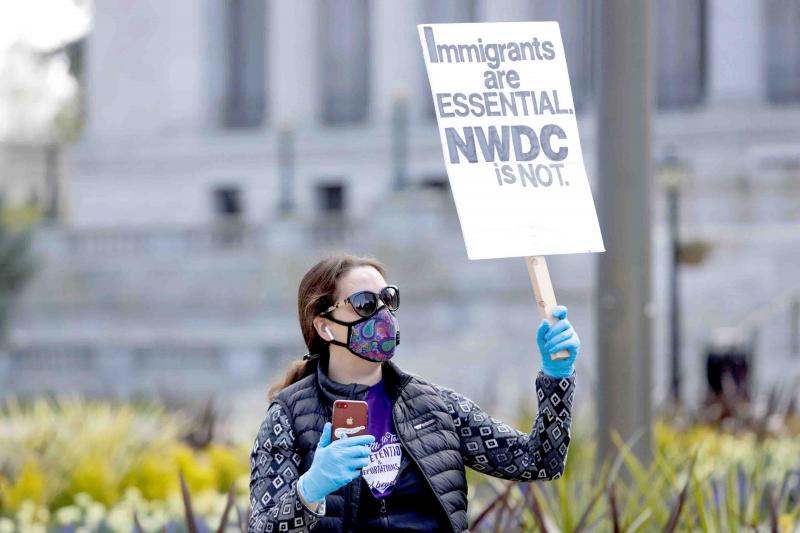Trump’s immigration ban is troubling but not as much as his fulminations on mosques
Pitching mosques into the febrile atmosphere of a world shut down by a pandemic merely feeds grievance politics, possibly taking it to dangerous heights.

Promising walls. A US protester in Seattle holding a sign referring to the Northwest Detention Centre in Washington state where immigrants are held. (Reuters)
What’s the point of Donald Trump’s new immigration ban? Just like his decision to ban Muslims from entering the US three years ago, Trump’s new, temporary immigration restriction lacks both sense and sensibility.
The US president cast his April 21 announcement as a jobs-protection measure, meant to “help unemployed Americans be first in line for jobs as America reopens.” It was a pointless statement meant to explain a pointless action.
The 2017 Muslim ban was ridiculous because no extremist from any of the seven countries on Trump’s list had carried out a fatal attack in the United States in 40 years; the 9/11 hijackers did not come from the banned countries – Somalia, Syria, Iran, Iraq, Libya, Sudan or Yemen – and refugees had not killed a single person in a terrorist attack in the US since the 1980 Refugee Act.
Trump’s new, temporary ban on immigration is ridiculous because the coronavirus outbreak has already led the State Department to put most consular services on hold around the world. Immigration to the US is neither occurring nor likely to occur any time soon with all visas and asylum claims, in effect, suspended. Refugee admissions have been suspended since March 19 after the United Nations and the International Organisation for Migration (IOM), an inter-governmental organisation, temporarily halted refugee travel. The US is not processing refugee arrivals and won’t do so until May 15 at the earliest. So, Trump’s new immigration suspension is meant for an already suspended system.
Add to that the discordant note struck by the Trump White House, which recently unveiled guidelines to help states across America decide on loosening lockdowns and reopening their economies. The new immigration suspension sends a contrary message. Trump has exempted foreign seasonal guest workers — fruit and vegetable pickers — one of the largest sources of immigration at the moment. With 26 million Americans filing for unemployment benefits in the past few weeks, wouldn’t it make sense for some of them to be drafted in to do the other jobs that are available and need doing?
The US president’s intentions are unclear, the motivation much less so. It’s not only Democrats who discern “xenophobic scapegoating” of foreigners in Trump’s new restrictions on immigration. Long-serving senators belonging to Trump’s Republican Party are also casting doubt on the logic and rationale for pausing legal immigration to the United States. Hours after Trump made his announcement, Chuck Grassley, the senior Republican senator from Iowa, noted: “We’ve been a welcoming nation and we need people.”
That isn’t the message Trump has sent in the five years he has been on the political stage. Just as with the 2016 election, it’s obvious his re-election campaign strategy will deploy tried and tested malevolent tools that trigger and weaponise racial and religious resentment of minorities, migrants and Muslims.
The strategy is increasingly obvious. Ahead of the holy month of Ramadan, Trump retweeted a comment by a conservative author asking if mosques in the United States would be subject to the same social distancing restrictions during Ramadan as churches during Easter. The suggestion seemed to be that Muslim places of worship generally receive better treatment than Christian ones at the hands of local governments and the law enforcement authorities. But Trump was unrepentant about his promotion of a specious and inflammatory idea. Asked by a reporter about his retweet, Trump offered a rambling response that was clear on only one point. “Because they go after Christian churches but they don’t tend to go after mosques. And I don’t want them to go after mosques! But I do want to see what their event is…the Christian faith is treated much differently than it was, and I think it’s treated very unfairly.”
No evidence has been presented in support of the claim. It sits oddly with the reality. There have been attempts to block mosque-building in places as disparate as New York City and Murfreesboro, Tennessee; mosque surveillance and Trump originally rose to political fame on his startling 2015 promise to literally ban all Muslims from entering the United States.
Pitching mosques into the febrile atmosphere of a world shut down by a pandemic merely feeds grievance politics, possibly taking it to dangerous heights. The new immigration suspension, too, is yet another brick in Trump’s promised wall between an exclusivist idea of America and everyone else.
Originally published in The Arab Weekly

